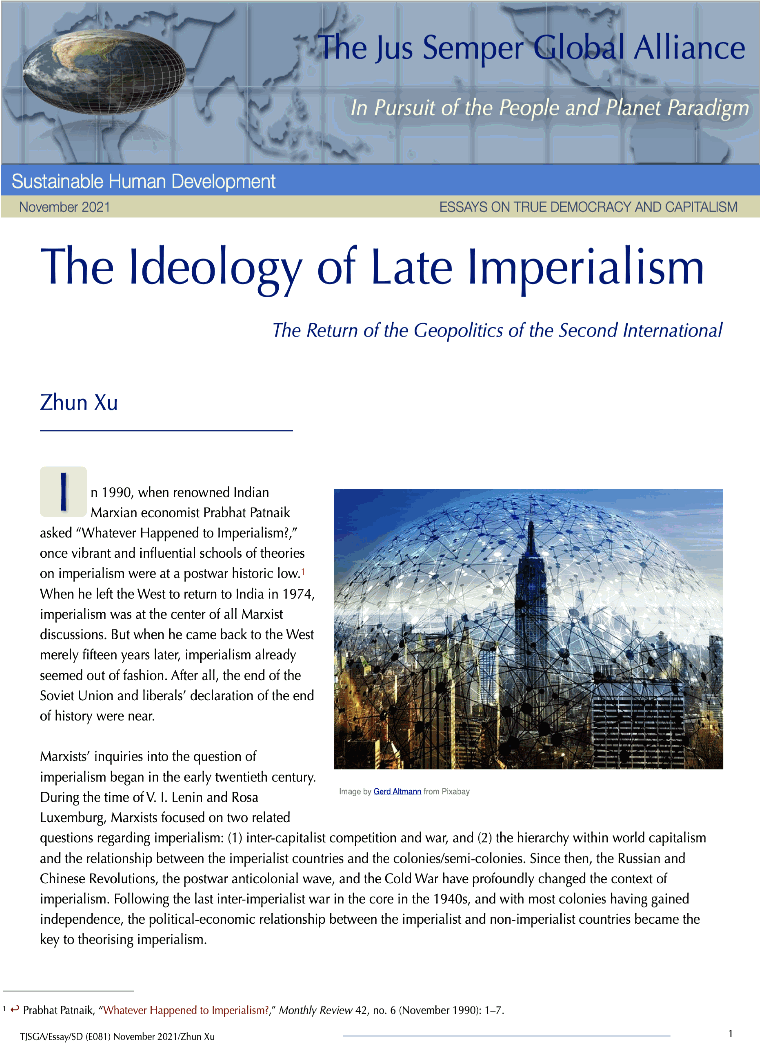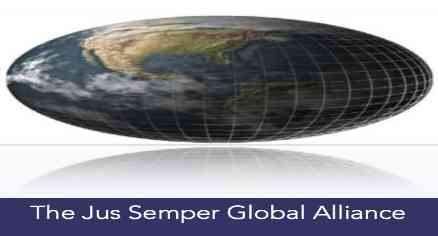The Return of the Geopolitics of the Second International
Zhun Xu Marxists’ inquiries into the question of imperialism began in the early twentieth century. During the time of V. I. Lenin and Rosa Luxemburg, Marxists focused on two related questions regarding imperialism: (1) inter-capitalist competition and war, and (2) the hierarchy within world capitalism and the relationship between the imperialist countries and the colonies/semi-colonies. Since then, the Russian and Chinese Revolutions, the postwar anticolonial wave, and the Cold War have profoundly changed the context of imperialism. Following the last inter-imperialist war in the core in the 1940s, and with most colonies having gained independence, the political-economic relationship between the imperialist and non-imperialist countries became the key to theorising imperialism. Since the 1950s, Marxist scholars have greatly deepened our understanding of imperialism by exploring underdevelopment and the centre-periphery, or dependency relationship, in world capitalism. Paul Baran’s The Political Economy of Growth is one of the earliest and best analyses of how feudal, imperialist, and comprador interests, as well as other unproductive uses of economic surplus, have kept back the third world. Later writers such as Samir Amin, Andre Gunder Frank, and Immanuel Wallerstein each developed a distinct but related approach to the rise of capitalism. Instead of focusing on just Western Europe and the United States, they also explored how the global division of labour and the more general world system, or imperialist system, transferred surplus from the periphery to the center, thus creating both development and underdevelopment simultaneously. Given this high tide of Marxist writings on imperialism in the 1960s and ’70s, the disappearance of imperialism from leftist discussion is quite remarkable. According to Google Books data (see Chart 1), the frequency of the term imperialism in a large sample of English-language books declined by more than 50 percent between 1974 and 1990. Even before the demise of the Soviet Union or neoliberal transitions in much of the world, analyses of imperialism were already disappearing in the United States and elsewhere. Patnaik suggested that this waning might be because of the very strengthening and consolidation of imperialism after the Vietnam War. This was evident from the tyranny of the global division of labour as well as the destructive functions of the International Monetary Fund and the World Bank. Besides these, there was also a more direct development among Western liberal and leftist intellectuals, which aimed politically to diminish anti-imperialist writings. Since the 1970s, well-known leftist writers such as Bill Warren, Robert Brenner, Michael Hardt, Antonio Negri, and David Harvey have contributed to this kind of intellectual counterrevolution. Aside from a change in research interests among scholars, the retreat from the question of imperialism has above all facilitated the rise of conservative ideology framed as leftist discourse. There has been a return of what we can call Second International politics, which essentially break from the Marxist traditions exemplified by Lenin and Mao Zedong, and severely limit revolutionary potential in the imperialist core. With this kind of thinking dominant among liberals and many leftists, possible domestic resistance to the U.S. imperialist state is reduced. This particularly illuminates the ongoing conflicts between the United States and China. The image of a rising China, an imperialist (yet not quite civilised) China, interestingly caters to different groups in both China and the United States. For years, the nationalist media in China has been bragging about a powerful China as an effort to reduce militancy among working people. Chinese leftists are mostly highly critical of such nationalist claims. At the same time, U.S. mainstream and the right wing have been successfully making their case based on the propaganda of an imperialist China. Utilising deep-rooted racism and anticommunist history, it serves the goal of scapegoating China and corrupting the U.S. working class. Even some leftist observers have uncritically argued that China now has become the number one enemy to the global working class. We are seeing the formation of a holy alliance in the imperialist United States dominated by reactionary Second International politics. Prabhat Patnaik warned that the retreat of analyses of imperialism would only mean the strengthening of the right wing in the core countries and Global South, helping to spawn racist, fundamentalist, and xenophobic movements. These profound insights are increasingly relevant as we move into the 2020s. The (Western) left in the imperialist center is at a historical moment. Without reconnecting with the anti-imperialist tradition, and without a careful analysis of the imperialism developed in the neoliberal era, it is likely the left will retreat further from its revolutionary past in the next decade or two. Whether to follow the Second International, or the traditions of the late Marx, Lenin, and Mao, is a vital question for all of us.
For a full read of this essay, click here or on the picture to download the pdf file.
|

- © The Jus Semper Global Alliance
| Home |  | Resources |  | Economic Data |  | The Ideology of Late Imperialism |


